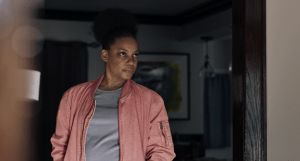‘The Subject’ Asks Who is Responsible for Art?

Chisa Hutchinson’s latest screenplay, The Subject, follows a documentarian two years after a subject of his is murdered. Starring Jason Biggs and Aunjanue Ellis, The Subject is an intense and hard-hitting look at white saviorhood, exploitation, and the conflict between artistic integrity and social responsibility.
Chisa Hutchinson is a Black, queer female writer, so intersectionality is nothing new to her. Lanie Zipoy directed the feature in a way that encapsulates all of the diverse conflict within the script. The Subject is full of singular people who have very defined perspectives and points of view. And their misunderstandings of one another only fuel the tension that rises throughout the film.
The film pretty much consists of two separate parts that are the culmination of a set of events spanning two years. Phil (Jason Biggs) is a young filmmaker/documentarian who chronicles the lives of “ghetto” kids, or kids from the inner city – Harlem, to be exact. His film, The Price of Brotherhood, follows young Malcolm (Nile Bullock), a young teenaged dropout that is trying to get into a gang which he insists is a brotherhood.
Malcolm is sadly killed in what appears to be an initiation gone wrong and Phil captures the moment on tape. It’s at this point that Phil makes an artistic decision that creates a domino effect of bad choices. He wins an Oscar and is screened at Sundance, but he nearly loses his soul in the process.
 The decision haunts him, but we soon learn that’s only the tip of the iceberg when it comes to the maladies surrounding Phil’s involvement – or lack thereof – in Malcolm’s death. The film begins two years after the incident and Phil is working on another project back in the same neighborhood.
The decision haunts him, but we soon learn that’s only the tip of the iceberg when it comes to the maladies surrounding Phil’s involvement – or lack thereof – in Malcolm’s death. The film begins two years after the incident and Phil is working on another project back in the same neighborhood.
This time the subject is Kwame (Caleb Eberhardt), a street tough young man whose mother is dying of cancer. To help with the shoot, he hires an assistant named Marley (Carra Patterson), who strokes his ego and assures him that every move he makes is brilliant.
Phil lives in a charming, suburban house with his girlfriend, Jess (Annabelle Acosta), a Latina boutique owner. In between wrestling with the inner conflict about his responsibility in Malcolm’s death, he’s living his life trying to be a good Samaritan to those around him. As The Subject unfolds, the story becomes much more layered, and much more complicated.
I mentioned perspectives and points of view and the direction really plays with that concept visually. The film was shot with four cameras: one for Malcolm’s documentary, one documentary camera on Kwame, the current subject, one that we see stalking Phil, recording his every move, and the narrative camera. These points of view also serve as representations of our core cast of characters.
The narrative camera is what Phil sees, and is limited in its view. The one following him casts him in a more sinister light, he stalks about like he’s got something to hide. The two documentary cameras show us the disconnect that Phil feels he must have in order to maintain his journalistic integrity. And when we see the camera turned on him, he immediately becomes cagey and defensive.
As The Subject builds, we’re slowly given parts of answers that help the story unfold. People show their true colors while others let their defenses down completely in the name of assuaged ego. If there’s any constructive criticism to be had, it’s simply that there’s far too much going on. Though it served to ensure that she wasn’t just the love interest, a side plot involving Jess was pretty unnecessary. There’s also an ongoing issue where Phil is ducking calls to make a comment.
The timeline could also be seen as a slight issue. It’d been two years since the event, but I was unclear as to why it was resurfacing now. When we start, Phil is in the middle of his documentary with Kwame, so it’s not like he started shooting and people began to ask. World building is important and necessary for any narrative film, but not when it takes away from the original point.
Even though it was telling and did drive the narrative, I probably could have done without the Marley storyline. I was far more interested in the ways Phil goes back and forth between hating himself and justifying his decisions.
We see his relationship with Kwame and there’s a real sense of care there. He helps him in the toughest moment of the young man’s life. Later we see Phil pull up to a bodega and chat with the old men on the corner. He helps to diffuse a situation and goes about his day satisfied. The question, however, is whether this is how Phil is, or is this how he’s trying to be since the incident with Malcolm?
We also learn that in these two years, though Phil was legally exonerated of any wrongdoing, he’s been dodging Malcolm’s mother Leslie (Aunjanue Ellis), refusing to return her calls or contact her. The second part of the movie is dedicated to the first meeting between Phil and Leslie.
This is where The Subject really comes into its own. We finally get to the truth behind the egos, the fear, the self-righteousness of Leslie, and the put-on cloaks of tolerance and “color blindness” worn by Phil. The scene explodes and it’s as frustrating as it is illuminating. Phil tells a story about how his family got mugged on their first trip to New York. They were held up at gunpoint and Phil wasn’t scared because he just imagined it was a movie.
Earlier in the film Malcolm asks Phil to teach him how to make movies and Phil – who went to school at Tisch – doesn’t know if it can be taught. There’s something proprietary within him when it comes to filmmaking. He’s selfish with it, he’s obsessed, and it’s that very attitude that proves to be both his downfall and his salvation.

The Subject is a film about how life is not. There are twists and turns that seem cinematic and they are. They are soon juxtaposed against the truth of everyday life, of the frailness and mercy of humanity. It’s a movie that doesn’t just ask you to consider a different point of view, but asks you to step forcibly outside of your own perceptions to see the truth. And once you see the truth, accept it. For some, that can be the hardest part of all.
Biggs does a good job playing a conflicted white man at the height of his privilege. And Ellis’s grieving mother smooths the rough edges to her actions. They play off each other well, as two people who think they know the other, but are missing key points of information between them. Eberhardt and Bullock do a magnificent job playing inner city kids just trying to get by. Bullock especially turns in a heartbreaking performance as he shows there’s more to Malcolm than just the ghetto.
Overall, The Subject is a fine film and worthy of a watch and hopeful discussion. The Subject can be found currently on VOD.
Author: StickyKeys
Help support independent journalism. Subscribe to our Patreon.
Copyright © The Geekiary
Do not copy our content in whole to other websites. If you are reading this anywhere besides TheGeekiary.com, it has been stolen.Read our
